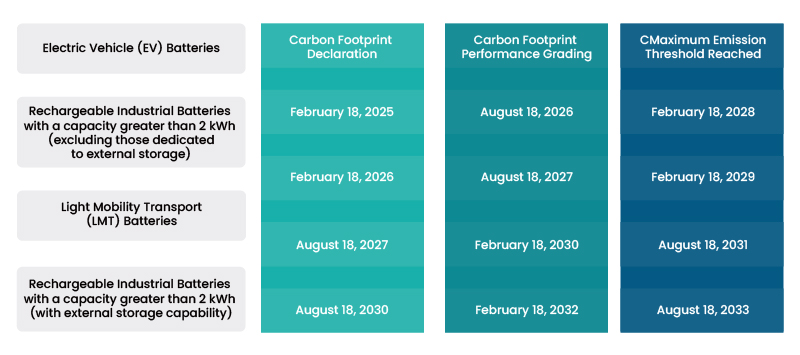On August 18, 2023, the "European Union Battery and Waste Battery Regulations" officially came into effect. The regulation mandates that electric vehicle batteries, light transportation vehicle batteries, and industrial charging batteries with a capacity greater than 2 kWh, in the EU market, must, at the earliest starting from 2025, provide battery carbon footprint reports compliant with the Product Environmental Footprint (PEF) and include statements and labels. Additionally, they must undergo third-party audit certification. Battery products that do not meet these requirements will be prohibited from entering the European Union market.
Effective Date of Carbon Footprint Requirements

*Portable batteries, with an industrial battery capacity not exceeding 2 kWh, are under consideration for inclusion in the future (by December 31, 2030).
Carbon Footprint Calculation
The calculation of the carbon footprint for European Union (EU) batteries must adhere to the Product Environmental Footprint (PEF) guidelines, which serve as the official EU standard and certification system for Life Cycle Assessment (LCA). PEF encompasses both carbon footprint assessment and carbon label certification. In the PEF's carbon footprint calculation method, battery manufacturers are required to decompose various stages in accordance with PEF's full life cycle framework, calculate carbon emissions from various activities, and combine them with the corresponding life cycle carbon emission factors to obtain carbon footprint data. These data are subject to independent verification and then verified by EU-designated auditing agencies before being publicly disclosed.
The system boundary for this calculation is illustrated in the diagram below, covering multiple stages: raw material acquisition and primary processing, main product manufacturing, distribution, end-of-life treatment, and recycling, excluding the battery usage phase. Notably, the production stages outlined with a red border are mandated to provide specific plant-level data. This signifies that manufacturers involved in these stages are required to disclose accurate carbon footprint data in accordance with PEF standards.

*The boundary diagram is based on the JRC Electric Vehicle Battery Carbon Footprint Calculation Rules (final draft), and the official text will be released before February 18, 2024.
Product Carbon Footprint Service Process
CIRS | Company | Period |
Send data questionnaire with attached guidance; | Complete data questionnaire; | 4 - 6 weeks |
Review data information, assist in improving data sheets; | Provide relevant supporting documents; | |
LCA modeling and calculation; Prepare product carbon footprint report; | Pay the fees; Respond to inquiries and provide relevant data support;; | 4 - 6 weeks |
Internal audit; Submit the report; | Receive the report; | 1 - 2 weeks |
Coordinate with NB (Notified Body) for external audit. | Collaborate with CIRS to address audits. | Schedule as per the NB's arrangements |
Required Materials
- Company introduction, business license, etc.
- Product introduction, production process flowcharts, etc.
- LCA questionnaire, including product material breakdown, transportation, factory energy consumption, product distribution, waste, etc.
- Material and energy consumption certification documents.
- Other necessary related documentation.
Service Fees
- LCA consultant consulting fees, including preliminary research, modeling assessment, carbon footprint report preparation, NB audit coordination, etc.
- Travel expenses, involving 1-2 factory site visits for carbon footprint calculation and audit.
- NB organization audit fees, subject to the NB organization.
Our Services
EU carbon footprint calculation covers multiple production stages, involves communication within multiple upstream and downstream supply chains, and the EU will ultimately set carbon emission thresholds. Therefore, we recommend that companies begin carbon footprint calculations for their products as soon as possible and establish a carbon emission management system for battery products based on carbon footprint data across the entire industry chain to promote carbon emission reduction efforts.
If you have any questions about battery carbon footprints or need further information about our services, please feel free to contact us at test@cirs-group.com.
We offer a range of professional services to help you address carbon footprint challenges:
- Product Carbon Footprint Method Training: We provide comprehensive training for your team to understand and apply the best carbon footprint calculation methods, ensuring your company meets the highest standards.
- Product Carbon Footprint Calculation and Reporting: With our extensive experience, we can calculate the carbon footprint of your products and generate detailed reports that demonstrate your product's carbon emissions at various life cycle stages.
- Product Carbon Footprint Audit Coaching: We provide professional audit coaching to ensure the accuracy and compliance of your product's carbon footprint data, as well as assist you in successfully navigating self-verification and assessment by audit agencies.
